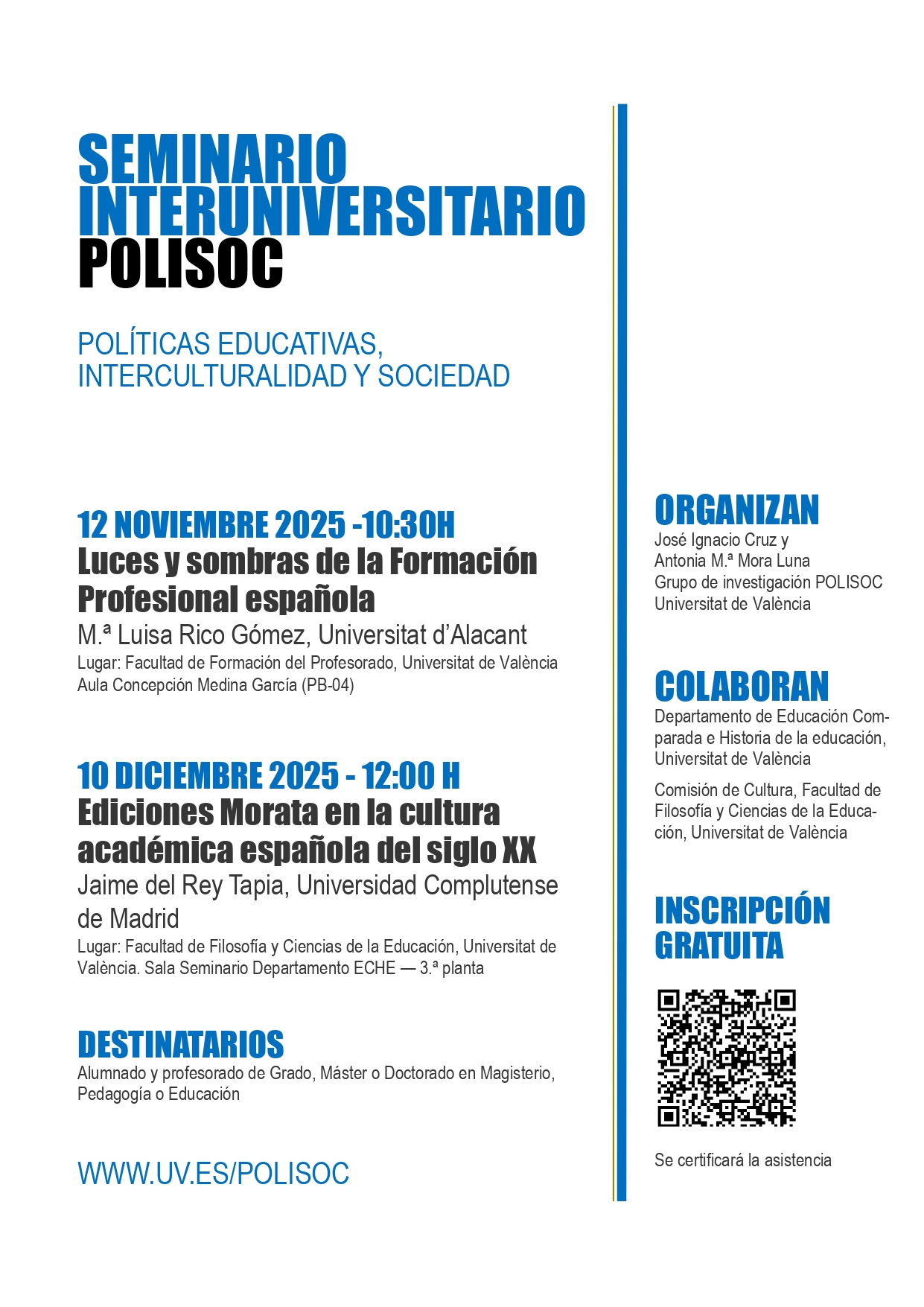
The Research Group on Educational Policies, Interculturality and Society (POLISOC) at the University of Valencia, within the framework of the Interuniversity Seminar, is pleased to invite you to the lecture-seminar entitled:
“Lights and Shadows of Spanish Vocational Education and Training”,
given by Professor María Luisa Rico Gómez from the University of Alicante.
Date: 12 November
Time: 10:30 a.m.
Venue: Faculty of Teacher Training, University of Valencia
Room: Concepción Medina García (PB-04)
Address: Avinguda dels Tarongers, 4, 46022 València, Spain
At present, vocational education and training (VET) represents one of the educational levels that generates the greatest interest and expectations, both within and beyond Spain—at the European and global levels (UNESCO, OECD, ILO, etc.). This fact highlights the need for a reformulation capable of empowering vocational education towards the social recognition it deserves. Such necessity stems from its historical trajectory.
Throughout the twentieth and twenty-first centuries, VET in Spain has undergone a complex process of fluctuations conditioned by socio-economic and political contexts, moving from a marginal form of education to an essential pathway for economic and social development. This evolution has resulted from a series of discontinuities involving both the State and the business sector, reflecting the persistent tension between the academic and the vocational spheres. Indeed, the historical trajectory of vocational education in Spain has been marked by a number of enduring negative perceptions that have confined it to a space of silence and neglect.
On the one hand, it has been characterised by low social prestige, by the persistent disconnection between productive structures and educational planning, by territorial inequalities derived from varying levels of industrialisation, by excessive centralised bureaucracy, and by a chronic lack of real investment that would enable its social recognition, as seen in other European countries such as Germany or France. On the other hand, VET has advanced in terms of institutional consolidation, particularly from the 1950s and 1960s onwards, during the years of Francoist developmentalism, when it responded to industrialisation and the demand for skilled labour by introducing practical training linked to enterprise. Furthermore, it has experienced a process of democratisation—especially since the 1970 General Education Act and throughout the 1980s—when it opened up to wider social sectors, including both young people and adults, and a process of professionalisation with the LOGSE and its alignment with European models of professional qualification.
This presentation thus focuses on analysing the discontinuities and milestones that help to explain the current situation of vocational education and training in Spain.
***
María Luisa Rico Gómez is a Professor in the area of Theory and History of Education within the Department of General and Specific Didactics at the University of Alicante. Her academic and research career has developed between Spain and France (CSIC and various French universities, including Université Paris Sorbonne-IV, Université Paris XIII, Université Paris VIII, Université d’Angers, and Université Savoie Mont Blanc). She has taught, and continues to teach, across different specialisations and levels, both undergraduate and postgraduate (Master’s and Doctorate), within degree programmes and areas related to the Educational Sciences.
Since the defence of her doctoral thesis entitled Société et éducation en Espagne: les écoles de formation professionnelle, 1923–1930 (2012), her research has been primarily linked to the field of the history of education and vocational training—particularly during the first half of the twentieth century—as well as to issues concerning initial teacher education, identity, memory, and educational heritage.
She has participated in numerous research activities and academic meetings at both national and international levels (Brazil, Colombia, Spain, France, England, Portugal, and Switzerland), serving as a speaker, coordinator, organiser, and member of scientific committees for conferences, symposia, and seminars. She has been, and continues to be, a member of various research groups and projects in Spain, France, and Latin America.
---
This activity is organised in collaboration with the Department of Comparative Education and History of Education and the Culture Committee of the Faculty of Philosophy and Education Sciences, University of Valencia.
Attendance at the seminars “Lights and Shadows of Spanish Vocational Education and Training” and “Ediciones Morata in the Spanish Academic Culture of the Twentieth Century” will be certified for students enrolled in the Doctoral Programme in Education at the University of Valencia.
📎 Registration and certificate request:
Scan the QR code below.






